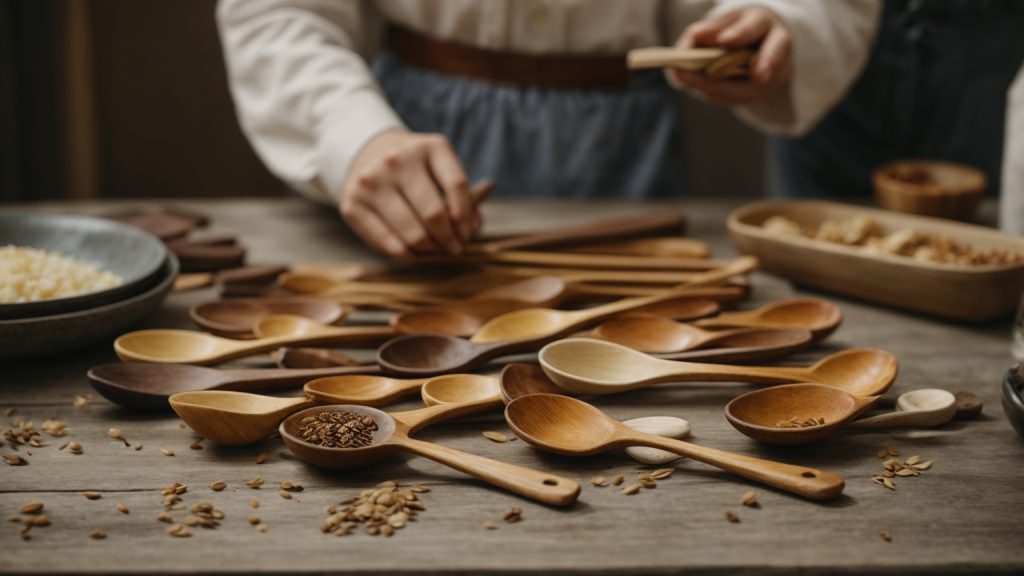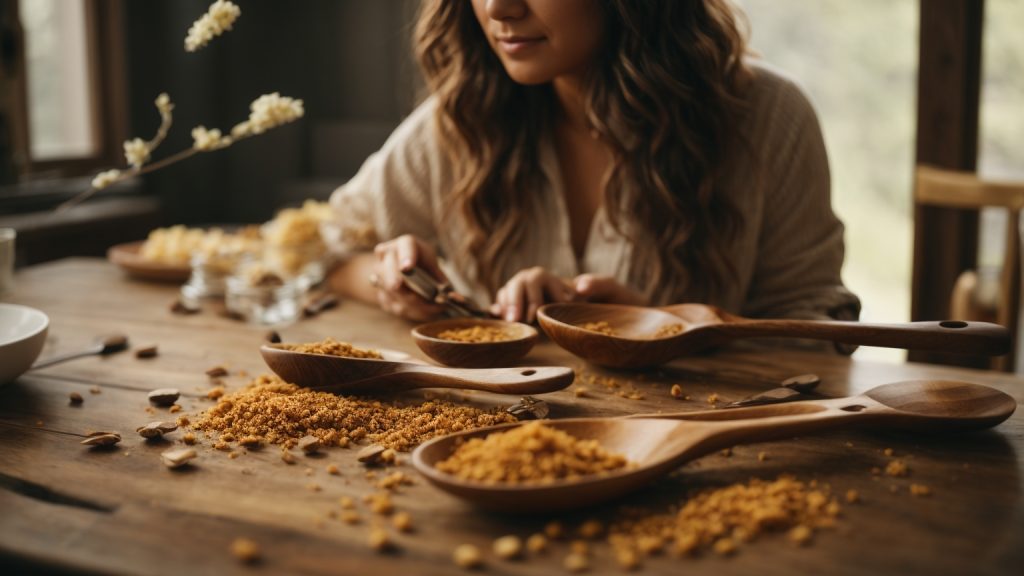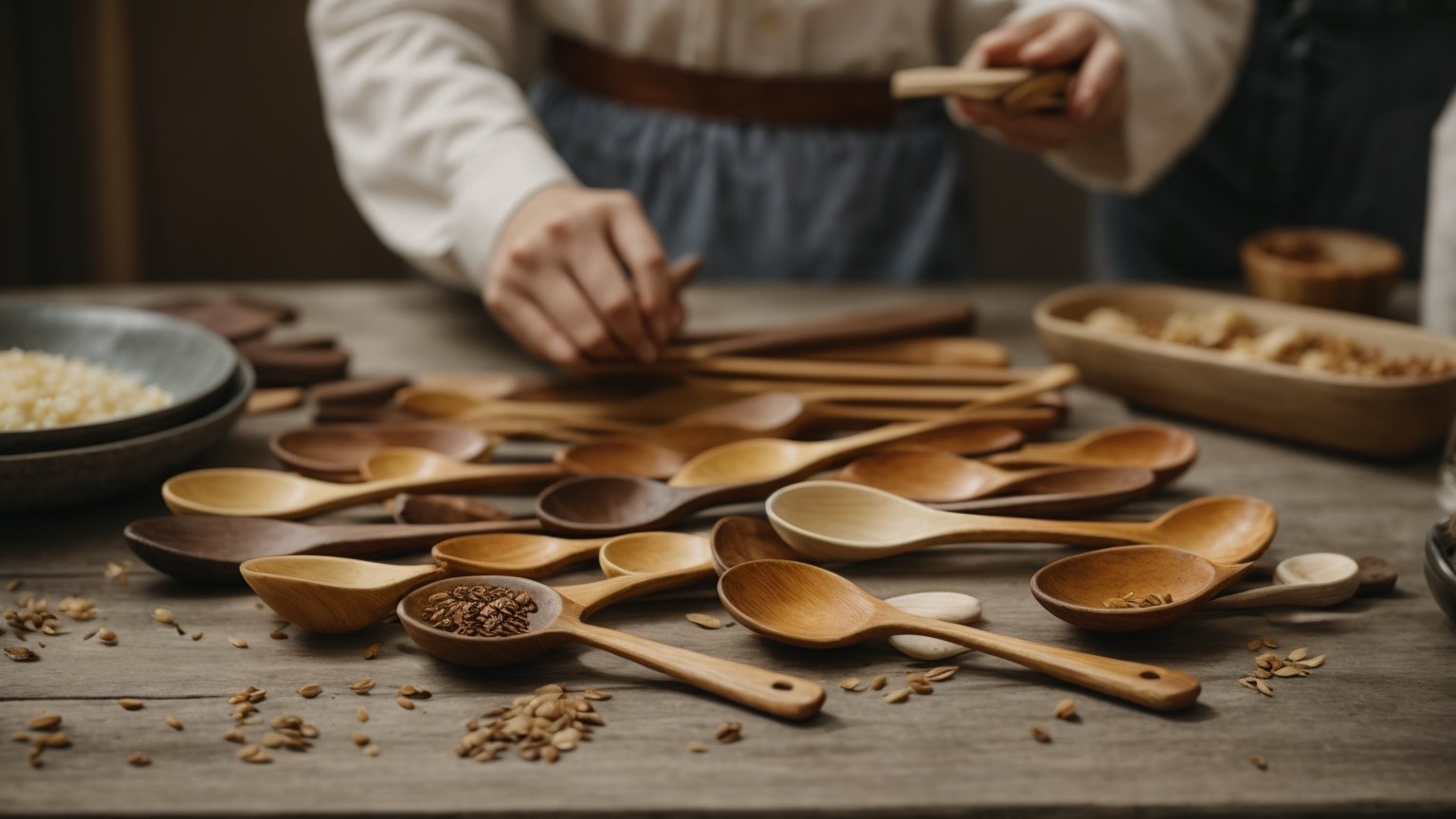Are you tired of your wooden spoons cracking or warping after just a few uses? If so, it may be time to start seasoning them. Seasoning wooden spoons is a simple process that can help prolong their lifespan and keep them looking and functioning their best.
To start, you’ll want to clean and dry your wooden spoons thoroughly. Then, you can apply a coat of mineral oil or a mixture of beeswax and oil to the spoons. This will help to protect the wood from moisture and prevent it from drying out and cracking. Repeat the process at least once a month to keep your spoons in top condition.
Understanding Wooden Spoons

Wooden spoons have been a staple in kitchens for centuries. They are versatile, durable, and can be used for a variety of tasks. Understanding the basics of wooden spoons can help you choose the right one for your needs and keep it in good condition for years to come.
Types of Wood
Not all wooden spoons are created equal. Different types of wood have different properties that affect their durability, resistance to heat and moisture, and overall performance. Here are some common types of wood used for making wooden spoons:
- Maple: Hard and durable, maple is a popular choice for wooden spoons. It is resistant to scratches and stains, and can withstand high temperatures without warping or cracking.
- Cherry: Cherry wood is known for its beautiful color and grain patterns. It is also durable and resistant to moisture, making it a good choice for spoons that will be used for cooking and serving.
- Beech: Beech wood is strong and dense, making it ideal for heavy-duty tasks like stirring thick sauces and batters. It is also resistant to moisture and won’t absorb flavors or odors.
- Walnut: Walnut wood is prized for its rich color and grain patterns. It is also strong and durable, but can be more expensive than other types of wood.
Care and Maintenance
Proper care and maintenance can help extend the life of your wooden spoons. Here are some tips to keep in mind:
- Seasoning: Seasoning your wooden spoons with oil or wax can help protect them from moisture and prevent them from drying out and cracking. See the previous search results for specific instructions on how to season your wooden spoons.
- Cleaning: Wooden spoons should be washed by hand with warm, soapy water. Avoid soaking them in water or putting them in the dishwasher, as this can cause the wood to warp or crack. If your spoon has a stubborn stain or odor, try rubbing it with a mixture of baking soda and water.
- Storage: Store your wooden spoons in a dry, well-ventilated area away from heat sources. Avoid stacking them on top of each other, as this can cause them to warp or crack.
By understanding the basics of wooden spoons and taking good care of them, you can enjoy their usefulness and beauty for years to come.
Why Season Wooden Spoons?
Wooden spoons are a staple in most kitchens. They are versatile, durable, and easy to use. However, if not properly cared for, they can quickly become damaged, stained, and even start to smell. This is where seasoning comes in.
Seasoning your wooden spoons involves treating them with oil or wax to help protect the wood from drying out, cracking, and absorbing unwanted odors and flavors. It also helps to maintain their natural beauty and extend their lifespan.
Here are a few reasons why you should consider seasoning your wooden spoons:
1. Prevents cracking and splitting
Wooden spoons are susceptible to cracking and splitting, especially if they are exposed to water or extreme temperatures. Seasoning your spoons with oil or wax helps to keep the wood moisturized and prevent it from drying out, which can lead to cracks and splits.
2. Repels odors and flavors
Wooden spoons can absorb odors and flavors from the food they come into contact with. This can be a problem if you’re using the same spoon to stir different dishes. Seasoning your spoons helps to create a protective barrier that repels unwanted odors and flavors.
3. Improves performance
Seasoning your spoons can also improve their performance. A well-seasoned spoon will glide smoothly through food, making it easier to stir and mix ingredients. It also helps to prevent the wood from sticking to food, which can be frustrating and messy.
In summary, seasoning your wooden spoons is an easy and effective way to protect and prolong their lifespan. It prevents cracking and splitting, repels odors and flavors, and improves their overall performance. With just a little bit of care, your wooden spoons can last for years to come.
Selecting the Right Oil
When it comes to seasoning your wooden spoons, selecting the right oil is crucial. You want to choose an oil that is food-safe, won’t turn rancid over time, and has a high smoke point. Here are three options to consider:
Food Grade Mineral Oil
Food-grade mineral oil is a popular choice for seasoning wooden spoons because it is odorless, tasteless, and won’t go rancid. It is also inexpensive and widely available. Mineral oil is a petroleum by-product, so it is not a natural product, but it is considered safe for use with food.
To use mineral oil to season your wooden spoons, apply a generous amount to the wood and let it soak in for several hours or overnight. Wipe off any excess oil with a clean cloth.
Beeswax
Beeswax is another option for seasoning wooden spoons. It is a natural product and has antimicrobial properties. Beeswax also creates a protective barrier on the wood, which can help prevent staining and moisture damage.
To use beeswax to season your wooden spoons, melt the wax in a double boiler and apply it to the wood with a clean cloth. Let it cool and then buff the wood with a clean cloth.
Coconut Oil
Coconut oil is a natural and food-safe oil that has a high smoke point. It is also relatively inexpensive and widely available. Coconut oil can penetrate the wood and help prevent cracking and warping.
To use coconut oil to season your wooden spoons, warm the oil in a double boiler and apply it to the wood with a clean cloth. Let it soak in for several hours or overnight, then wipe off any excess oil.
When selecting the oil to use for seasoning your wooden spoons, consider your personal preferences and the type of wood you are working with. Remember to always choose a food-safe oil and follow the manufacturer’s instructions for use.
Preparation Before Seasoning

Before you start seasoning your wooden spoons, you need to prepare them properly. This will ensure that your spoons are clean and ready to absorb the oil or wax that you will use to season them. Here are the steps you need to follow:
Cleaning the Spoon
The first step is to clean your wooden spoon thoroughly. Use warm water and mild dish soap to remove any dirt, residue, or food particles. If your spoon has any stubborn stains, you can use a mixture of baking soda and water to scrub them away. Be sure to rinse the spoon well with warm water to remove all soap residue.
If your spoon has any buildup, you can soak it overnight in a 1:1 ratio of white vinegar and water. Note: you typically don’t want to submerge wooden spoons in water, but a once-off is fine. This will help remove any bacteria and odors that may have accumulated on the spoon.
Drying the Spoon
After cleaning your wooden spoon, you need to dry it thoroughly. Use a clean towel to pat the spoon dry. Be sure to remove all moisture from the spoon, as excess water can cause the wood to warp or crack.
Once you have dried the spoon, you should leave it to air dry completely. This will ensure that all moisture has evaporated from the wood. Avoid using a hairdryer or any other heat source to dry the spoon, as this can damage the wood.
By following these simple steps, you can prepare your wooden spoons for seasoning. Once your spoon is clean and dry, you can move on to the next step of seasoning.
Step-by-Step Guide to Seasoning
If you’ve just purchased a new wooden spoon or cutting board, it’s important to season it before use. Here’s a step-by-step guide to seasoning your wooden spoons:
Applying the Oil
- Clean the wooden spoon thoroughly with warm water and mild dish soap to remove any dirt, residue, or food particles. Rinse the spoon well and pat it dry with a clean towel.
- Use a rag to apply a thick coat of mineral oil to your spoons. Be sure to work with the grain.
- Rub the oil into the wood, making sure to cover the entire surface of the spoon.
- Repeat the process until the spoon is completely coated in oil.
Letting the Oil Penetrate
- Give the oil several hours to soak into the wood. This will allow the oil to penetrate the pores of the wood, helping to prevent it from drying out and cracking.
- For best results, let the oil penetrate for at least 24 hours before using the spoon.
Wiping Off Excess Oil
- After the oil has had time to penetrate the wood, come back and wipe off any excess oil with a clean rag.
- Repeat the process at least once a month to keep your wooden spoons in good condition.
Remember, seasoning your wooden spoons is an important step in maintaining their longevity and preventing them from cracking or warping over time. By following these simple steps, you can ensure that your wooden spoons will last for years to come.
Maintaining Your Seasoned Spoons
Once you have seasoned your wooden spoons, it’s important to maintain them properly to ensure that they last a long time. Here are some tips on how to keep your seasoned spoons in top condition:
Regular Re-seasoning
Even though you have already seasoned your wooden spoons, they will still need to be re-seasoned periodically. This is especially true if you use your spoons frequently or if you wash them with soap and water.
To re-season your spoons, simply apply a thin layer of mineral oil or beeswax to the surface of the spoon and let it soak in for a few hours. Then, wipe off any excess oil or wax with a clean cloth. Repeat this process once a month to keep your spoons in good condition.
Safe Cleaning Methods
When it comes to cleaning your wooden spoons, it’s important to avoid using harsh chemicals or soaking them in water for extended periods of time. Here are some safe cleaning methods to use:
- Use a mild soap and warm water to clean your spoons. Be sure to rinse them thoroughly and dry them completely before storing them.
- If your spoons have any stubborn stains, you can use a paste made from baking soda and water to gently scrub them clean.
- To sanitize your spoons, you can wipe them down with a solution of white vinegar and water. Just be sure to dry them thoroughly afterwards.
- Avoid putting your spoons in the dishwasher or soaking them in water for extended periods of time, as this can cause the wood to warp or crack.
By following these simple tips, you can keep your wooden spoons in great condition for years to come.
Common Mistakes to Avoid
When it comes to seasoning wooden spoons, there are a few common mistakes that people make that can cause damage to the wood or prevent the seasoning from being effective. Here are some things to keep in mind to avoid these mistakes.
Using the Wrong Oil
One of the biggest mistakes people make when seasoning wooden spoons is using the wrong type of oil. Some oils, such as vegetable oil or olive oil, can go rancid over time and cause the wood to smell bad. Other oils, such as linseed oil or tung oil, can take a long time to dry and may leave a tacky residue on the wood.
Instead, use a food-safe mineral oil or beeswax to season your wooden spoons. These oils are odorless, won’t go rancid, and will absorb into the wood quickly.
Not Allowing Enough Time for Oil to Absorb
Another mistake people make is not allowing enough time for the oil to absorb into the wood. It’s important to give the oil several hours to soak in before wiping off any excess. If you don’t allow enough time for the oil to absorb, it won’t be as effective at protecting the wood.
Neglecting Regular Maintenance
Finally, one of the biggest mistakes people make is neglecting regular maintenance of their wooden spoons. Even if you’ve seasoned your spoons properly, they still need to be maintained to keep them in good condition.
This means wiping them down after each use, washing them by hand with warm, soapy water, and allowing them to air dry completely before putting them away. It also means reapplying a thin coat of mineral oil or beeswax at least once a month to keep the wood hydrated and protected.
By avoiding these common mistakes, you can ensure that your wooden spoons will last for years to come and continue to be a valuable tool in your kitchen.
